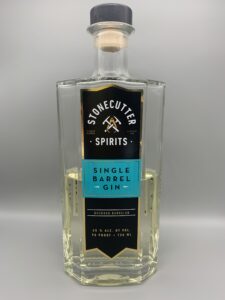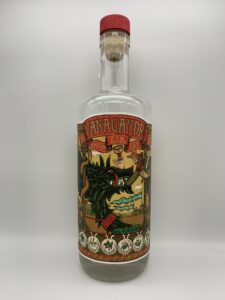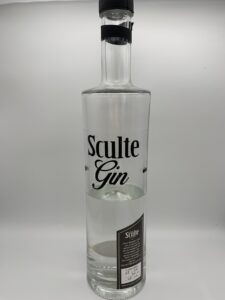 Stonecutter Spirits are based in rural Vermont, in a 12,000 sq foot distillery overlooked by mountains. Situated as it is, their weather frequently changes humidity, temperature and pressure, and here they set up their distillery where they create whiskey and barrel aged gin. The gin is not only gluten free, but also certified Kosher, made with cardamom, orange peel, juniper, liquorice root and coriander, plus unusual botanicals rose petals and green tea. The botanicals were picked to complement the Kentucky bourbon barrels and enhance the caramel notes; they say that the barrels help bring the flavours together and blend the cardamom, orange and green tea. In 2019 their gin won a Double Gold at the San Francisco International Spirit Awards, so let’s see how it holds up.
Stonecutter Spirits are based in rural Vermont, in a 12,000 sq foot distillery overlooked by mountains. Situated as it is, their weather frequently changes humidity, temperature and pressure, and here they set up their distillery where they create whiskey and barrel aged gin. The gin is not only gluten free, but also certified Kosher, made with cardamom, orange peel, juniper, liquorice root and coriander, plus unusual botanicals rose petals and green tea. The botanicals were picked to complement the Kentucky bourbon barrels and enhance the caramel notes; they say that the barrels help bring the flavours together and blend the cardamom, orange and green tea. In 2019 their gin won a Double Gold at the San Francisco International Spirit Awards, so let’s see how it holds up.
Month: August 2020
Vanagandr gin
 Vanagandr gin is the product of Enrique Pena, who left his career in business to set up and build his own distillery from scratch. Made in the autonomous community Galicia in northern Spain, he distils his gin in super small batches of 440 bottles at a time. Alongside the usual suspects juniper and angelica root, he also adds in sweet orange and lemon peel, green cardamom, nutmeg, cassia and ceylon cinnamon. The gin is then blended with fresh water sourced just 100m from the distillery. As well as handpicking his botanicals, Vanagandr gin uses a base spirit which is 100% wheat which, combined with the 14 hour slow distillation process, produces a rich gin with a soft finish.
Vanagandr gin is the product of Enrique Pena, who left his career in business to set up and build his own distillery from scratch. Made in the autonomous community Galicia in northern Spain, he distils his gin in super small batches of 440 bottles at a time. Alongside the usual suspects juniper and angelica root, he also adds in sweet orange and lemon peel, green cardamom, nutmeg, cassia and ceylon cinnamon. The gin is then blended with fresh water sourced just 100m from the distillery. As well as handpicking his botanicals, Vanagandr gin uses a base spirit which is 100% wheat which, combined with the 14 hour slow distillation process, produces a rich gin with a soft finish.
Sculte gin
 For today’s blog we raid the shelves of the random bottles given to me by an old housemate, and with this head to the Netherlands with Sculte gin. Based in a former monastery near the German border, founder Gerard Velthuis set up his distillery and now makes whisky, gin and brandy capturing the spirit of the Twente region. Using barley as a base, they make their gin with juniper, herbs and onions. Now, that sounds a tad strange (and it is), but the town they are based in, Ootmarsum, is also called the Siepelstad (Onion town) which is their main tourist draw. I’m confused, hesitant and slightly curious about how this will taste – but having just learnt to make a Gibson martini, if it tastes of onions then at least I have a starting point…
For today’s blog we raid the shelves of the random bottles given to me by an old housemate, and with this head to the Netherlands with Sculte gin. Based in a former monastery near the German border, founder Gerard Velthuis set up his distillery and now makes whisky, gin and brandy capturing the spirit of the Twente region. Using barley as a base, they make their gin with juniper, herbs and onions. Now, that sounds a tad strange (and it is), but the town they are based in, Ootmarsum, is also called the Siepelstad (Onion town) which is their main tourist draw. I’m confused, hesitant and slightly curious about how this will taste – but having just learnt to make a Gibson martini, if it tastes of onions then at least I have a starting point…